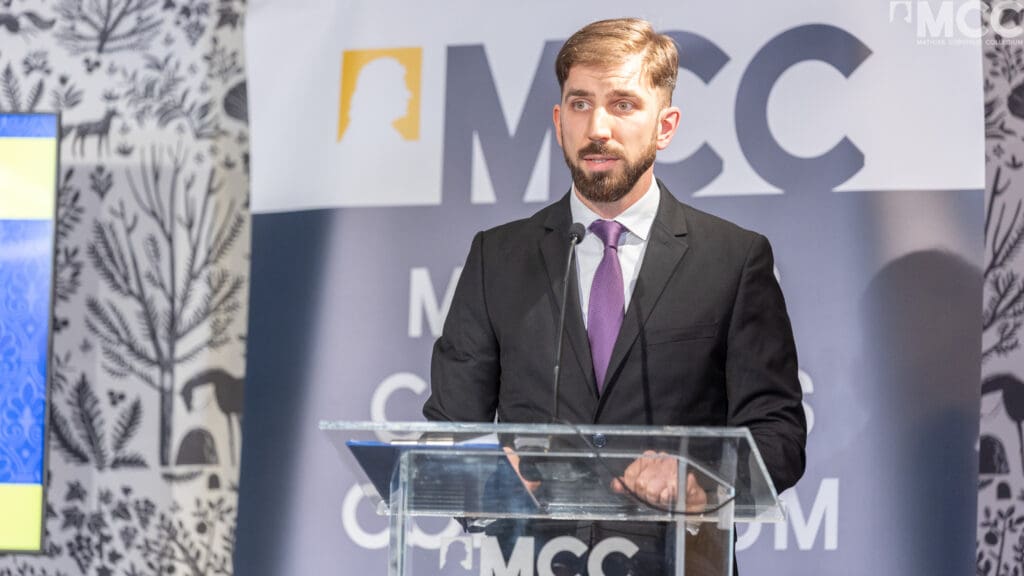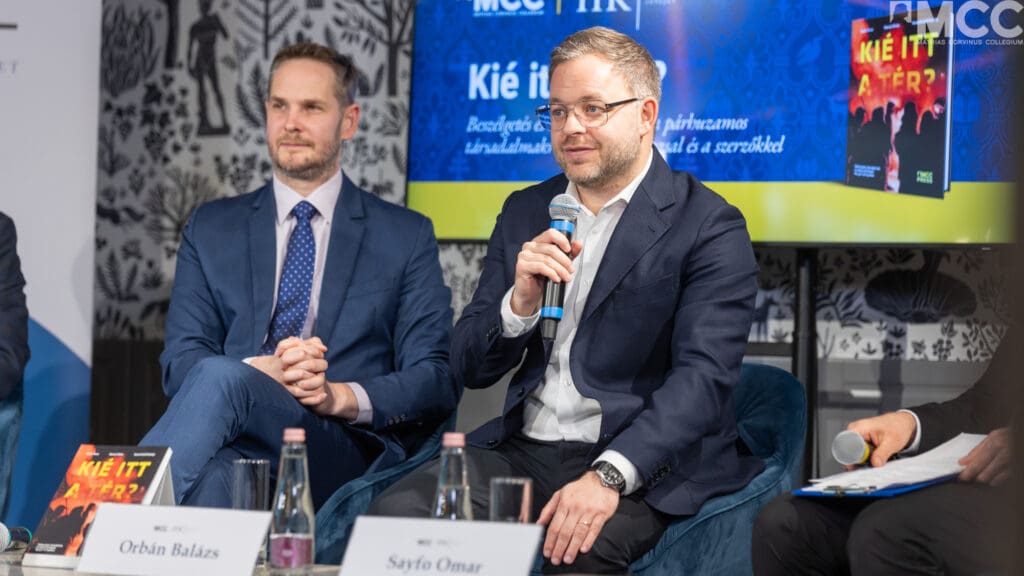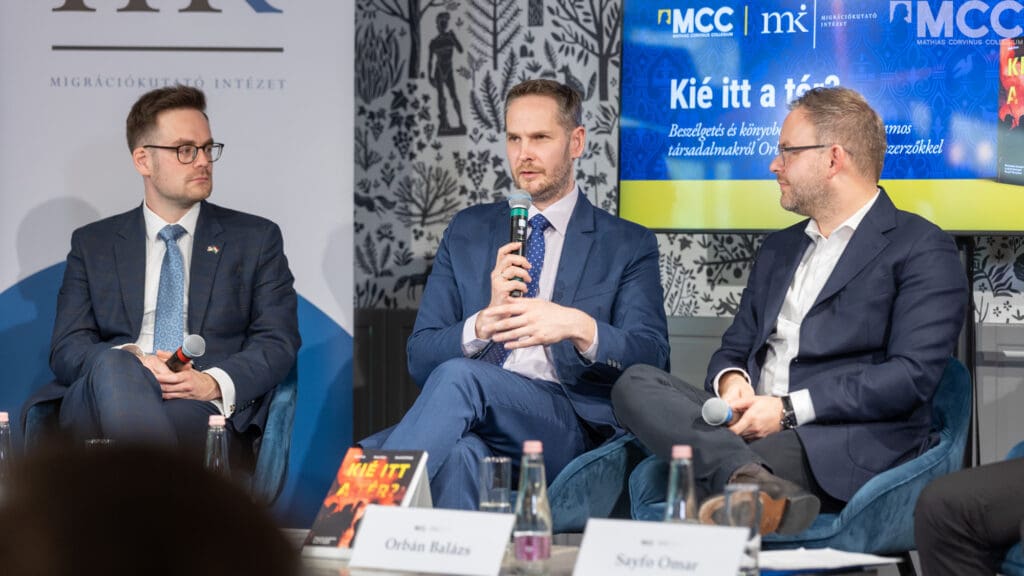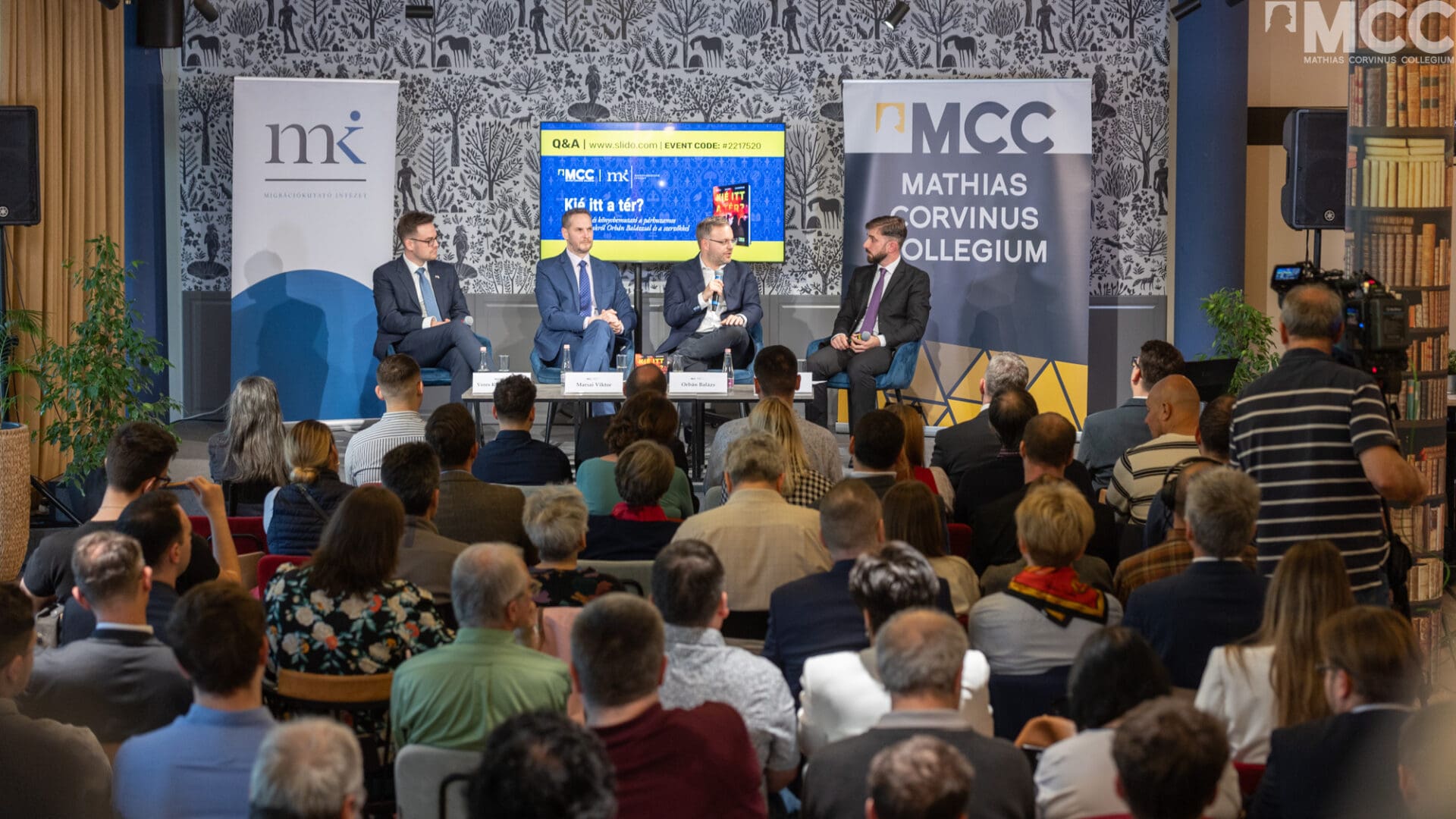On 4 April 2024 a panel discussion was held at MCC Budapest as part of the launch of the new book published by MCC Press and the Migration Research Institute titled Kié itt a tér? (Who does this space belong to?). The book discusses whether there are no-go zones in Europe. Speakers at the book launch included Balázs Orbán, the political director of the Prime Minister; Viktor Marsai, Executive Director of the Migration Research Institute; Kristóf György Veres, International Director of the Danube Institute; and Omar Sayfo, Head of Research at the Migration Research Institute.
Omar Sayfo, one of he authors of the book, began by stating that book stands out as a remarkable and unique piece of work. While there is existing literature on the subject, none is as comprehensive. To write the book every piece of available material had to be thoroughly examined, often involving personal visits to pertinent locations. The picture painted is complex, describing diverging realities in the different districts studied.

Sayfo, who also hosted the event, then addressed his first question to Balázs Orbán, noting that the government has long been raising concerns about the dangers of immigration. Initially, many denied or accused the Hungarian government of fear-mongering, he recalled, and asked whether the discourse has shifted in Western Europe since then.
According to Balázs Orbán, there has been a shift in Western Europe from outright denial to acknowledgment of the issue.
Reality has become too strong to ignore, breaking through the barriers erected by the mainstream.
Many in the Western upper-middle class were unaware of the existence of ‘no-go zones’ because they had had never encountered them. These parallel societies, living alongside each other without acknowledgment, only come to the forefront during times of economic decline or ideological conflict. Now, compared to 2015–2017, this is everyday reality in Western Europe, impossible for the mainstream discourse to evade.

The question arises: what can be done about it? There are no channels through which forced integration can occur as these people are legally protected. It’s a checkmate situation: there is the paradox that the Western debate on migration focuses on integration, yet genuine integration is not possible. In Central and Eastern Europe the nature of the debate is entirely different. There are no parallel societies here; challenges exist, but they do not reach the level of ‘no-go zones’, Balázs Orbán stressed. He underlined that the migration discourse can only progress if the existence of no-go zones for instance is acknowledged in the West and people reject their existence. According to the political director, we are already at the beginning of this process.
Responding to the next question, Viktor Marsai explained that European thinking has come a long way, but migration studies continue to have a strong humanitarian focus, emphasizing human rights and the social situation of immigrants, with little attention given to security issues. While this approach is valid and important, the security aspect must not be ignored either. The book aims to contribute to the discourse by highlighting this issue. So while the some recognition has occurred, the implementation of good practices and solutions are still lacking in many places. Denmark provides a good example, Marsai remarked, noting that
the Danes quickly realized that it is impossible to integrate so many people and decided to reduce the numbers.
The aim there is to dismantle ghettos and eliminate parallel societies. Marsai recalled that integration requires participation from both sides: if immigrants do not cooperate, it cannot succeed. That is what the Danes have understood and decided that those who could not be integrated would be sent back home.

Regarding the Latino population in the United States, Kristóf György Veres remarked that the situation is very similar to what happened in Europe. There was an irregular migration wave from Mexico at one point, with over 19.62 million people coming in. The root causes are similar to those of the migration to Europe: people started arriving for work from Mexico under a programme in the 1920s. However, the programme was abolished in the 1960s without providing alternative immigration routes for workers. By this time, migrants had integrated into agriculture, and their employers lobbied the government to avoid punishment for employing illegal immigrants. After an amnesty for three million people, family reunification and chain migration occurred. So in response, border security strengthened, making it increasingly difficult to enter the US illegally. Consequently, many stopped commuting and remained in the US year-round. Over time, they began to penetrate various industries, including processing. Around 2014 families from Honduras, Guatemala, and El Salvador started arriving, who, after being temporarily apprehended by border security agents, were released and disappeared for 6–8 years inside the US due to the slow processing of their immigration applications.
Returning to the issue of no-go zones, Balázs Orbán recalled that years ago there was no scientific discourse concerning security issues related to migration, so the Hungarian government decided to found the Migration Research Institute. As part of a programme, discussions were held experiences shared in places like Bangladesh and Libya, providing direct personal insights. It’s essential for the institute to have a presence in the field, the political director underscored, and it’s commendable that this has been achieved. In terms of his personal experience, Balázs Orbán said he has visited many places, including Stockholm, where he observed first hand the contrast between the central areas of the city and the ‘no-go zones’. While the buildings were similar to those elsewhere in Sweden, the environment was entirely different. The people he saw were mostly men with long beards. Balázs Orbán recalled that he was there with a female colleague and they went to sit down for a coffee. While he was not conspicuous at first, since he was a man with a beard, too, they would not serve his female colleague, and since he was the one sitting down with her, they ended up not serving him either. Afterwards they visited a store where a Roma woman was begging in Arabic.
When asked about the connection between failed integration and Islam, Viktor Marsai opined that the real issue is not whether the immigrants are Muslims, as many arriving are Christians.
It is rather about the consequences of arriving from failed states.
Those coming from countries with functional state structures can comprehend and interpret the state’s function, while others come from fragmented societies. In these communities, survival for centuries has been based on loyalty to the clan. Elsewhere, the development of the state preceded. Migrants have difficulty relating to strong abstractions such as the fact that it is individuals they don’t know who make decisions about their fate. In Somalia, for instance, there is a national consciousness but no political consciousness. For Somalis, governance consists of clan-based parties and alliances vying for power. When one clan is in power, they have access to resources, leaving others out. Clan allegiance still dictates everything. So when they arrive in Western Europe, they establish a diaspora based on this principle, unable to comprehend the Swedish state for example, because their clan isn’t in parliament. If this continues, it will erode Western societies, Marsai opined.
Asked what he thought of the stereotyping of Latino immigrants in the US as being lazy and unwilling to work. Is this true, Veres highlighted that immigration into the United States is primarily a labour issue. There is no welfare state; in the US, ‘if you don’t work, you die’. So 85 per cent of Latino males participate in the labour market, which in fact is a higher proportion than that of white males. They take up jobs and conditions others wouldn’t, at the wages offered. Additionally, they can be threatened with deportation if they unionize or complain, so there’s always the threat that people would call ICE (US Immigration and Customs Enforcement) and report them. On the other hand, this mass influx has drastically depressed wages for American unskilled workers. Mass immigration has driven down wages to the point where American citizens literally can’t find work. The EU is in a better position, Veres argued, because in the US there’s no official language; Spanish-speaking immigrants can live their entire lives without learning English. They could not do that in Europe, though.

(R) PHOTO: MCC
Replying to a question about the EU institutions’ attitude to migration and what the EP elections this summer may bring, Balázs Orbán said currently member states are being pushed towards mass acceptance. He recalled the adoption of the Migration Pact, which he suggested was unlawful as no EU-level regulation can be adopted without the consent of all member states. Although Hungary and Poland opposed it, the pact was still accepted. He stressed that there are many dimensions to the issue, stressing that for instance the mandatory distribution mechanism would require Hungary to accommodate immigrants who have never been and don’t want to be in the country. Also, refugees would have to be accommodated in open reception centres in the country, which is unacceptable for both Hungary and Poland. There is now an open political battle being waged in this regard, the political director noted, with many seeing externalization as the solution to the migration problem, as Hungary does. Also, there should be negative consequences if someone tries to enter a country illegally; people shouldn’t be able to gain legal status afterwards. Balázs Orbán concluded that for things to change, a different European Parliament is needed, and people can vote for that change in the upcoming EP elections.
Related articles:








